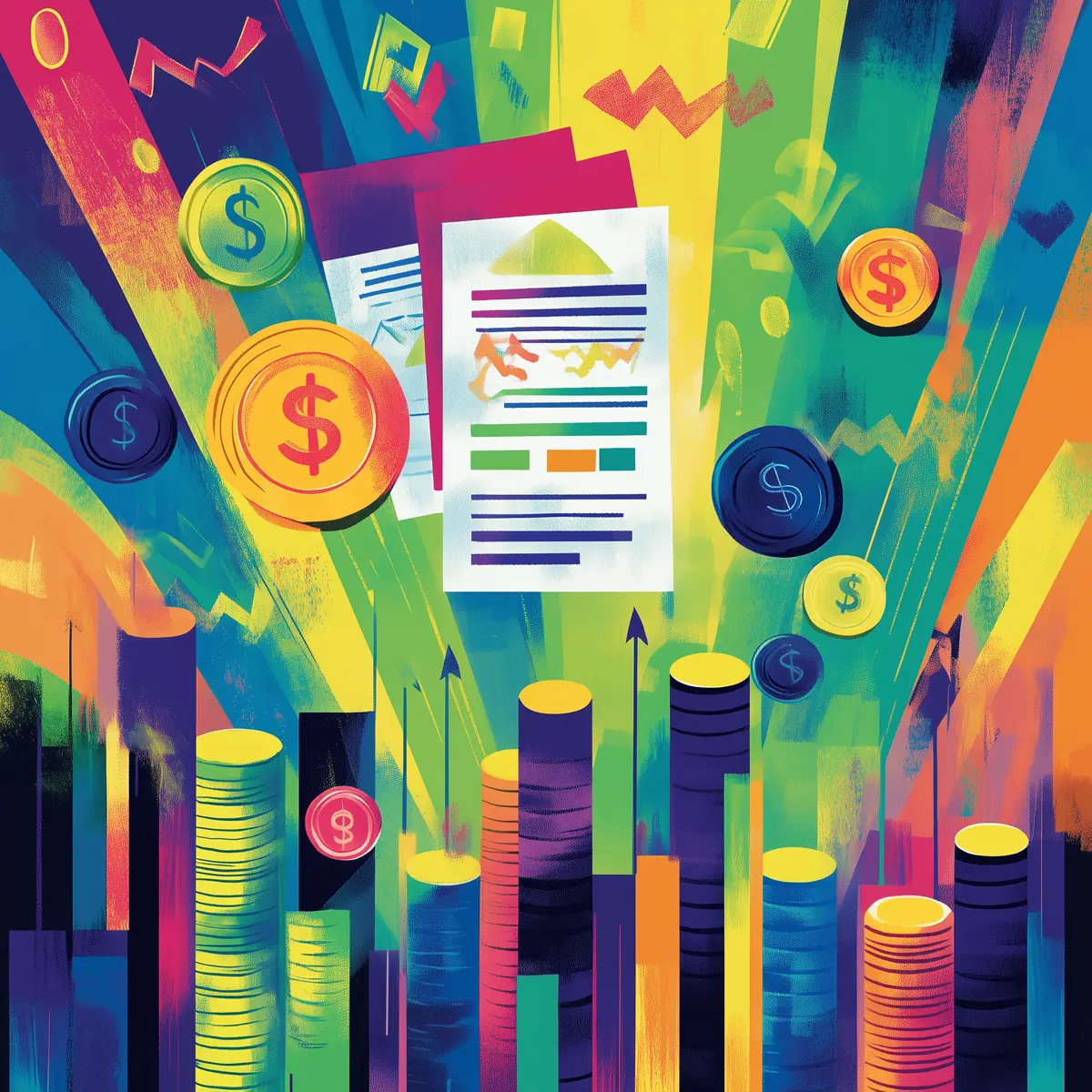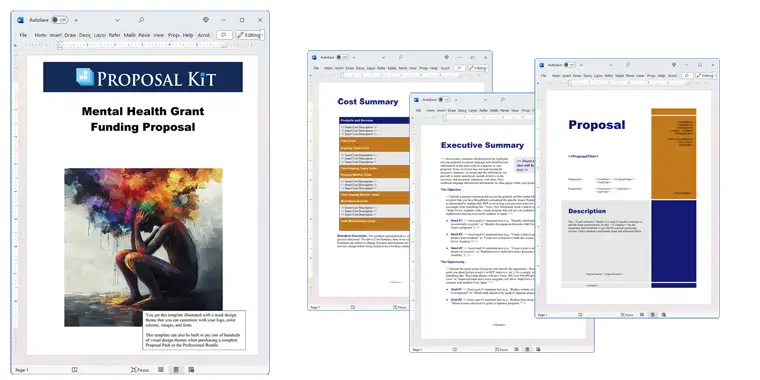How to write your Mental Health Grant Funding Proposal
We include this 29 page layout with every Proposal Pack. If you want this template to have a different visual design theme than the one illustrated here, purchase any Proposal Pack design and create this template using the purchased design theme. This template is included in every Proposal Pack. If you get a Proposal Pack or the Professional Bundle, you can also make any variation of this template with different chapters to suit your needs.
We typically include more chapters in the templates than most people will need to give everyone more variety in the chapters they may need. You can trim down a long template by removing pages you do not need or combining multiple chapter topics into one page.
 DOWNLOADABLE, ONE-TIME COST, NO SUBSCRIPTION FEES
DOWNLOADABLE, ONE-TIME COST, NO SUBSCRIPTION FEES If you need this template on DVD media order from our Amazon shop.
If you need this template on DVD media order from our Amazon shop.
You can also create countless variations of this document to suit your needs using the included library of 2200+ chapters if ordering a Proposal Pack or Pro Bundle.
 What Our Clients Say
What Our Clients SayI originally bought Proposal Pack Wizard to automatically assembly documents in my proposals. With 100s of sample proposals (technical and non-technical), the "Novice" or "Expert" features, and the ability to migrate old Wizard installations to the new version, it’s a no-brainer. Oh did I mention their stellar support and the fact that each Proposal Kit is licensed for [five] people? If you are thinking about purchasing Proposal Kit, I suggest you take a strong look at Proposal Pack Wizard also."
msDynamicsPlus LLC.
Related Article
Related Video
Related Templates
- Supplemental Proposal for Additional Funding
- Grant Proposal for Special Needs Support
- Domestic Violence Support Program Funding Proposal
- Mental Health Support for Employees Proposal
- Non-profit Community Healthcare Program Proposal
- Art Therapy Grant Proposal
- Healthcare Grant Proposal
- Healthcare Provider Grant Proposal
- Mental Health Communication and Tracking App Proposal
- Stress Management in Workplace Proposal
- Mental Health Proposal Template
- Transitional Housing Project Proposal
- Healthcare Psychological Services Proposal
- HHS Federal Government Grant Proposal
- Healthcare Services Provider Proposal
- Managed Healthcare Services Provider Proposal
- Medical Support Project RFP Response Proposal
- Grief Counseling Non Profit Seeking Funding Proposal
- Medical Clinic for Community Funding Proposal
- Healthcare Services Provider Proposal 2
- Long Term Healthcare Services Proposal
- Non profit Community Healthcare Program Proposal
- Indigenous Community Funding Project Proposal
- HHS Federal Government Grant Proposal 2
- Grant Funding Request Proposal
- Halfway House Proposal
- Transitional Housing Funding Proposal
- Substance Abuse Program Proposal
What's the best way to write your mental health grant funding proposal?
A proven approach to creating an effective mental health grant funding proposal is using the Proposal Kit template and software package. This system not only simplifies the creation process with its comprehensive suite of tools but also incorporates a line item quoting database for detailed cost summaries, quotes, estimates, budgets, and other financial documentation.
If you need to prepare such a proposal, is there a streamlined way to manage this complex task? The answer is yes, with Proposal Kit.
What Types of Projects Are Mental Health Grant Funding Proposals Written For?
Mental health grant funding proposals cater to various projects to improve mental health services and community outreach. These proposals are vital for securing the necessary funds to support these initiatives. Typical projects include:
- Community mental health awareness campaigns
- School-based mental health services
- Suicide prevention programs
- Substance abuse treatment programs
- Support for mental health in homeless populations
- Crisis intervention services
- Training for mental health professionals
- Development of online mental health resources
- Mental health research studies
- Implementation of telepsychiatry services
- Programs for veterans' mental health
- Child and adolescent mental health services
- Mental health first aid training
- Support groups for various mental disorders
- Art therapy programs
- Mental health policy advocacy
- Integration of mental health services in primary care
- Mental health screening initiatives in at-risk communities
- Support for mental health in LGBTQ+ communities
- Anti-stigma mental health campaigns
Chapters this template is built with
No single template perfectly fits all mental health grant funding proposals, as each project has unique requirements. Proposal Kit software helps you create customized proposals with its extensive library that includes thousands of chapter templates. Below is a sample list of these chapters and how they specifically cater to mental health grant funding proposals:
Cover Letter
A personalized cover letter introduces your organization and outlines your request. It sets the stage for the proposal and expresses a commitment to the cause. In a mental health grant funding proposal, the cover letter should briefly describe your organization's mission, the specific mental health issue you're addressing, and a high-level overview of the project. This letter aims to capture readers' attention and compel them to review the proposal.
Introduction
This chapter provides an overview of your organization and the specific mental health issue you are addressing, setting the stage for the detailed proposal. It should include a brief history of your organization, your mission, and why mental health is an important focus area for you. This section establishes your credibility and lays the groundwork for detailed discussions in subsequent sections.
Executive Summary
A concise summary that captures the essence of the proposal and its goals, making a solid case for why the funding is needed. The executive summary should distill the most important topics of your proposal, including the problem, proposed solution, expected outcomes, and a summary of the budget. This is often the first section read by potential funders, so it must be compelling and concise.
Needs Assessment
Detail the specific needs your project aims to meet, supported by data and research to validate the necessity of the intervention. In a mental health grant funding proposal, this section would include statistics on mental health issues within the target community, gaps in existing services, and testimonials or case studies to highlight urgent needs. The goal is to make a data-driven argument for why your project is essential.
Goals and Objectives
Clearly define your project's objectives and expected outcomes, ensuring they are measurable and time-bound. For example, your objectives might include reducing the incidence of depression by 20% among teenagers in the community within two years. Each goal should have specific, measurable indicators to track success easily.
Project Methods
Outline your strategies and methodologies to meet your objectives, including innovative approaches. This section might detail your plans for community outreach, partnerships with local schools, or the use of specific therapeutic techniques. Explain how these methods are evidence-based and why they are the best approaches for achieving your goals.
Therapies
Discuss the therapeutic interventions you plan to use tailored to the needs identified in your assessment. For example, you might include cognitive-behavioral therapy (CBT) for individuals suffering from anxiety and depression or family therapy sessions for adolescents. Explain why these therapies are appropriate for your target population and how they will be implemented.
Treatment
Detail the treatment protocols for various mental health conditions that your project will address. This might include structured treatment plans for conditions like PTSD, bipolar disorder, or substance abuse. Include information on how treatments will be administered, by whom, and the anticipated duration and intensity of treatment.
Project Background
Provide context on previous projects or ongoing efforts demonstrating your organization's commitment and expertise. This could include summaries of past successful initiatives, lessons learned, and how these experiences will inform the current project. Highlight any partnerships, awards, or recognitions that lend credibility to your proposal.
Age Range
Specify the demographic your project will serve, focusing on age-specific interventions if applicable. For instance, if your project targets adolescents aged 12-18, explain why this age range has been chosen and how the interventions are tailored to the developmental needs of this group.
Project Management
Describe your project's management structure, including key personnel and their roles. This section should outline the qualifications and responsibilities of the project team, including project managers, therapists, outreach coordinators, and any other key staff. Highlight any relevant experience they have in managing similar projects.
Time Line
Present a clear timeline for project implementation, highlighting significant milestones and phases. This might include the start date, recruitment periods, phases of therapy sessions, evaluation periods, and project end dates. A visual timeline can be particularly effective in this section.
Resources
List the resources and those you will need to execute the project successfully. This could include human resources, facilities, partnerships, and other assets critical to your project. Explain how these resources will be allocated and managed.
Equipment
Detail the equipment necessary to support the therapies and treatments you plan to provide. This might include medical supplies, therapy tools, or technology for telehealth services. Specify why this equipment is necessary and how it will be used.
Health and Wellness
Discuss how your project will promote overall health and well-being and specific mental health outcomes. This section could cover initiatives like physical fitness programs, nutritional counseling, or stress reduction workshops. Explain how these complementary activities will enhance the effectiveness of your mental health interventions.
Community
Explain how the project will engage the community and stakeholders to maximize impact. Detail plans for community outreach, education campaigns, or partnerships with local organizations. Community engagement is crucial for building trust and ensuring the project's success.
Psychology
Delve into the psychological theories and practices underpinning your project's treatment and support approach. For example, discuss the application of cognitive-behavioral theory, humanistic psychology, or psychodynamic approaches. Explain why these theories are relevant and how they will be applied in your project.
Evaluation
Outline how you will measure your project's effectiveness, including qualitative and quantitative methods. This could include pre- and post-intervention surveys, interviews, focus groups, and clinical assessments. Explain how the evaluation will be conducted and how the findings will be used to improve the project.
Uses of Funds
Itemize how the requested funds will be used, linking expenses directly to project activities. This section should provide a detailed breakdown of costs, such as salaries, equipment, supplies, and administrative expenses. Each item should be justified in terms of its necessity for the project.
Funding Request
Formally request the funding needed, providing an argument for the investment. Summarize why the project is essential, the required funding, and how it will be used. Make a persuasive case for why the funder should invest in your project.
Budget
Provide a detailed budget that includes all project expenses, ensuring transparency and accountability. This comprehensive financial plan should align with your project's goals and activities. Include direct and indirect costs, and explain any assumptions or calculations used.
Company History
Share your organization's history to build credibility and trust among potential funders. Highlight key milestones, past successes, and your organization's overall impact on mental health. This section helps demonstrate your capacity to manage and execute the proposed project.
References
Include references to studies, data, and other sources that support your proposal's claims and methodologies. Cite relevant research, best practices, and other authoritative sources validating your approach. This adds credibility and demonstrates that your proposal is grounded in evidence.
Beneficiaries
Describe who will benefit from your project and how their lives will be impacted. This could include individuals, families, and the broader community. Explain the expected improvements in mental health outcomes and overall well-being.
Mission Statement
Reiterate your organization's mission and how the project aligns with it. This section should link the proposed project to your organization's core values and long-term goals, helping to reinforce the alignment between your project and your overall mission.
Policies
Detail any relevant policies that govern your project's implementation and ensure ethical standards. This could include consent procedures, confidentiality policies, and safeguarding protocols. Explain how these policies will be enforced to protect participants and ensure ethical conduct.
Use cases for this template
Expanding Community-Based Mental Health Services
The Challenge
Jessica from Healing Horizons Ltd. faced the challenge of securing funding to expand their community-based mental health services. The need was critical, as the mental health issues in the community were escalating, with numerous individuals lacking access to crucial mental health care. However, articulating this need in a proposal took time due to the intricacies involved in grant writing and the specific requirements of various funding bodies.
The Solution
Jessica decided to use the Proposal Kit to structure her proposal efficiently. She could clearly define the project scope and its impact on the community by leveraging templates such as Needs Assessment and Community Engagement. The templates helped streamline the process, ensuring all necessary components were included and professionally presented.
The Implementation
She customized the templates to reflect her community's specific needs and demographics. By integrating compelling data and case studies that highlighted the urgent need for services, she was able to paint a vivid picture of the community's mental health crisis. Jessica also included a detailed timeline and budget to illustrate how the funding would be used effectively.
The Outcome
The well-structured and detailed proposal was instrumental in securing the necessary funding. As a result, Healing Horizons Ltd. increased their accessible mental health services, significantly improving the well-being of individuals in the community. The proposal's success also enhanced the organization's reputation, opening doors for future funding opportunities.
Launching an Online Mental Health Platform
The Challenge
Mark, tasked by MindBridge Solutions Inc., needed to quickly write a proposal for an internal project to launch an online mental health platform. The deadline was tight, and the pressure was high, as the project was deemed necessary to the company's objectives. Mark was concerned about meeting the deadline while maintaining the quality of the proposal.
The Solution
Mark chose the Proposal Kit for its comprehensive templates and streamlined process. Recognizing the time constraints, he also used an AI writing tool to assist in creating specific chapters by analyzing content from their company website. This dual approach enabled him to gather relevant information quickly and efficiently.
The Implementation
The AI tool helped populate the Proposal Kit templates with pertinent data, case studies, and project details, ensuring the proposal was thorough and well-organized. Mark customized the templates to align with the company's goals and vision for the online platform, detailing the expected benefits and the innovative features it would offer.
The Outcome
The proposal was completed on time, impressing the management team with its professionalism and depth. The internal funding for the project was secured, and the online mental health platform was launched successfully. The platform has since helped thousands of users access mental health resources conveniently, marking a significant achievement for MindBridge Solutions Inc.
Funding a Veterans' Mental Health Program
The Challenge
Lucy, a director at Veteran Wellness Alliance, needed to write an RFP to invite proposals for a veterans' mental health program. The task was to ensure the RFP was comprehensive and set clear expectations for potential responders. Lucy was aware that the success of this initiative depended on attracting high-quality proposals from capable service providers.
The Solution
Using the Proposal Kit, Lucy created a detailed and structured RFP. She used templates like Project Background and Evaluation to define the project's scope and criteria, ensuring that all necessary information was included and presented clearly. This approach helped streamline the RFP creation process and maintain a high-quality standard.
The Implementation
Lucy customized the Proposal Kit templates to address the specific needs of veterans. She included detailed sections on the desired outcomes, evaluation methods, and funding requirements, clarifying what was expected from potential bidders. This comprehensive approach ensured that the RFP provided all the information needed for applicants to submit informed and competitive proposals.
The Outcome
The RFP process attracted several qualified bidders, each presenting robust and innovative proposals. After a thorough evaluation, a high-quality provider was selected to implement the program. The chosen provider successfully executed the project, benefiting the veterans' community by offering tailored mental health services and support. The initiative has since been recognized as a model program for veterans' mental health care.
Conclusions and Recommendations
Using Proposal Kit templates and software significantly eases the task of writing mental health grant funding proposals. The structured approach and customizable templates address the specific needs of various mental health projects, helping organizations articulate their goals and secure necessary funding effectively.
Also Known As
This template may also be referred to in different ways or be used in more specialized situations, such as:
- Mental Health Funding Request
- Mental Health Support Initiative Proposal
- Mental Health Project Grant Application
- Community Mental Wellness Funding Proposal
- Mental Health Research Grant Submission
- Behavioral Health Program Funding Proposal
- Proposal for Mental Health Intervention Funding
- Grant Proposal for Psychiatric Services Funding
- Mental Health Advocacy Funding Application
- Funding Proposal for Mental Health Education
Abstract
 Creating an effective mental health grant funding proposal involves several key components that ensure a comprehensive approach to addressing mental health challenges. The Mental Health Services Administration supports projects that focus on early intervention and the implementation of evidence-based practices. A proposed mental health program often includes a detailed evaluation plan to assess its impact and effectiveness. Eligibility requirements must be clearly defined to determine the target beneficiaries, and a comprehensive guide should be followed to increase access to necessary resources and support.
Creating an effective mental health grant funding proposal involves several key components that ensure a comprehensive approach to addressing mental health challenges. The Mental Health Services Administration supports projects that focus on early intervention and the implementation of evidence-based practices. A proposed mental health program often includes a detailed evaluation plan to assess its impact and effectiveness. Eligibility requirements must be clearly defined to determine the target beneficiaries, and a comprehensive guide should be followed to increase access to necessary resources and support.
The use of Proposal Kit software significantly aids in assembling these complex documents by offering an extensive library of customizable templates. These templates assist organizations in creating proposals that are professional and compelling, covering crucial topics such as project goals, objectives, and methods. Technical assistance is provided through structured templates that streamline the proposal process, ensuring all necessary content areas are addressed.
Understanding federal guidelines and laws is crucial for gaining approval and securing funding. Proposals should include evidence-based practices and detailed methodologies, with clear guidance on how the proposed interventions will be implemented by qualified counselors. The proposal should also include a notice of the intended impact, with a responsible approach to project management and evaluation.
 By incorporating these topics, organizations can articulate their mental health projects' value and need, increasing their chances of receiving funding to enhance community mental health services and support initiatives.
By incorporating these topics, organizations can articulate their mental health projects' value and need, increasing their chances of receiving funding to enhance community mental health services and support initiatives.
In the landscape of mental health funding, creating a well-structured grant proposal is important for securing the resources needed to address critical community issues. The Mental Health Services Administration plays a role in guiding organizations to develop projects that adhere to national standards and foster improved mental health outcomes. Through using technical assistance, organizations can enhance their understanding of how to implement evidence-based practices within their proposals. This ensures that interventions are not only innovative but also grounded in proven methodologies that can withstand rigorous evaluation.
Eligibility requirements are a core component that determine which populations will benefit from the proposed services, and it is crucial to clearly outline these criteria to align with the funders' objectives. By providing thorough documentation and a comprehensive report, proposals can demonstrate the necessity and potential impact of the project. This level of detail and understanding fosters trust and credibility with potential funders, making it more likely that the proposal will receive approval.
 The Proposal Kit enhances the proposal development process by offering a streamlined approach to document assembly, allowing organizations to focus on articulating their mission and objectives clearly. With its automated line-item quoting and extensive content libraries, the Proposal Kit ensures that all facets of the proposal are professionally presented, contributing to a case for funding.
The Proposal Kit enhances the proposal development process by offering a streamlined approach to document assembly, allowing organizations to focus on articulating their mission and objectives clearly. With its automated line-item quoting and extensive content libraries, the Proposal Kit ensures that all facets of the proposal are professionally presented, contributing to a case for funding.
Ultimately, a well-written proposal can significantly impact the target audience by increasing access to important mental health services, offering early interventions, and improving overall community health and well-being. By aligning with federal guidelines and using available resources, organizations can advocate for the support they need to make a positive difference in mental health care.
Developing a mental health grant funding proposal is an important task that requires planning and careful alignment with the Mental Health Services Administration's directives. These proposals are vital for addressing pressing mental health needs within communities and often encompass a range of initiatives, from crisis intervention to the integration of mental health services in primary care settings. By adhering to eligibility requirements, proposals can clearly identify the target demographics that will most benefit from the project, ensuring that the resources are allocated to those in greatest need.
 The incorporation of evidence-based practices within these proposals is imperative. Such practices not only ensure that interventions are effective but also increase the proposal's credibility and appeal to potential funders. Highlighting a comprehensive understanding of these practices showcases the organization's commitment to implementing solutions that have been scientifically validated.
The incorporation of evidence-based practices within these proposals is imperative. Such practices not only ensure that interventions are effective but also increase the proposal's credibility and appeal to potential funders. Highlighting a comprehensive understanding of these practices showcases the organization's commitment to implementing solutions that have been scientifically validated.
Moreover, proposals that successfully articulate the potential benefits of the program can lead to increased access to mental health resources, thereby improving the quality of life for the affected populations. By using Proposal Kit, organizations can streamline their proposal development process, ensuring that all critical components "from detailed project descriptions to budget justifications "are created and aligned with the funders' expectations.
In summary, a well-conceived mental health grant funding proposal not only addresses immediate community needs but also lays the groundwork for long-term improvements in mental health care delivery, fostering a more supportive and responsive health system.
Frequently Asked Questions
How do I start writing a mental health grant funding proposal?
Begin with a clear and concise cover letter that introduces your organization and the purpose of your proposal. Follow this with an introduction that provides an overview of the mental health issue you are addressing. Use the Proposal Kit templates, which guide you through each section, ensuring you cover all critical components like Needs Assessment, Goals and Objectives, and Project Methods. This structured approach helps you organize your thoughts and present your case effectively.
What should a mental health grant funding proposal include?
Start with an Executive Summary that encapsulates your project's goals and objectives. The specific mental health needs are detailed in the Needs Assessment section, supported by data and research. Clearly outline your project methods, including the therapies and treatments you will employ. Include a detailed budget and funding request to show how the funds will be used. Ensure you have a project management plan and a timeline for implementation. Using Proposal Kit's extensive library of templates can help you ensure that all these elements are covered effectively.
How can I demonstrate the need for my mental health project?
To demonstrate the need for your mental health project, provide a thorough Needs Assessment. Use relevant data and research to highlight the specific mental health challenges faced by the community you aim to serve. Incorporate statistics, case studies, and testimonials to substantiate your claims. Emphasize the gap in existing services and how your project will address these gaps. Proposal Kit templates can assist you in structuring this information logically, ensuring your proposal convincingly argues the necessity of your project.
What are the best ways to measure the success of a mental health project in a grant proposal?
Measuring the success of a mental health project involves setting clear, measurable goals and objectives. In your proposal, outline both qualitative and quantitative metrics you will use to evaluate progress. For instance, you might include pre- and post-treatment surveys, statistical analyses of program participation, and qualitative feedback from participants. Explain your evaluation methods and the tools you will use to collect data. Using Proposal Kit templates can guide you in detailing these evaluation methods coherently, making your proposal more robust and credible.
How can I ensure my mental health grant funding proposal stands out to funders?
To ensure your mental health grant funding proposal stands out, tailor it to the specific interests and guidelines of the funder. Make your case compelling by clearly articulating the impact of your project and presenting strong evidence of need. Use a well-organized, error-free proposal that follows a logical structure. Including personal stories or testimonials can humanize your data and make your proposal more engaging. Proposal Kit helps by providing customizable templates that ensure you cover all critical topics and present your information professionally, enhancing your chances of securing funding.
15% Off Discount
![]() Add To Cart This Word Template Only
Add To Cart This Word Template Only
 Add To Cart Proposal Pack for Any Business
Add To Cart Proposal Pack for Any Business
 Add To Cart Proposal Kit Professional Bundle
Add To Cart Proposal Kit Professional Bundle
 4.7 stars, based on 846 reviews
4.7 stars, based on 846 reviewsProposal Kit chapters used in this template
Cover Letter, Title Page, Table of Contents, Introduction, Executive Summary, Project Background, Needs Assessment, Goals and Objectives, Project Methods, Project Management, Beneficiaries, Community, Health and Wellness, Psychology, Therapies, Treatment, Age Range, Time Line, Resources, Equipment, Evaluation, Uses of Funds, Funding Request, Budget, Company History, References, Policies, Mission Statement, Back Page
Included Calculator Spreadheets
These Excel calculator spreadsheets are included with this template. If you purchase a Proposal Pack or the Professional Bundle, these proposal pages are generated using an automated line-item database in the included Wizard software. The calculator spreadsheets are intended for use when purchasing only the static Word template.
Time Line Calculator, Funding Request Calculator, Budget Three Year Calculator
You use this proposal for
- General business proposal
- Non-technical proposal
- Project pitch proposal
- Non-government grant, non-profit, NGO proposal
- Medical, healthcare, wellness proposal
How to create this template with Proposal Pack Wizard
You can create this document using any of the logo-designed Proposal Packs. Pick any Proposal Pack with a logo design theme you like best; they will all work equally well. The Proposal Pack for Any Business is the pack with no extra added logos or colors - designed to be used plain or for you to customize with your logos and graphics.
The Proposal Pack design theme you purchase will determine the visual look of this template. The screenshot above only shows the plain generic design theme. Names and stories in examples are fictional; however, the templates are from real client use cases.
We include a library of chapters to be assembled based on your needs. All proposals are different and have different needs and goals. We designed Proposal Pack so you can customize the documents to suit your needs.
You will best create this document using the Proposal Pack Wizard - Expert Edition software to select this template and build it in the Proposal Pack logo design theme of your choice along with any desired customizations (such as adding additional chapters, removing unneeded chapters, changing the order of chapters, and importing your company logo). This template outlines a proposal for the described situation. Each user is responsible for typing in the actual content of the provided pages with their information to complete the proposal. Suggestions in the abstract may include features in higher-end packages and are facilitated by the selection of chapter templates to support the narrative of each proposal, which help guide the user in filling in the details.
You create this template using the Wizard software with an entire Proposal Pack library and software. We include the Expert Edition of the software in the Proposal Kit Professional bundle. Microsoft Word for Windows is required to use the customizing software. You can also edit Word document templates in other office software such as Word for Mac. We will assist Mac users in assembling complex templates for their first project if they do not have the required platform to run the Wizard software.
You only get the single assembled Word document if purchased as a stand-alone template. The individual template products include no other templates, samples, or software.
How to Build Templates Featured on Proposal Kit Website
Many people find the Proposal Kit website after searching for a specific proposal. Once you've purchased and installed the software, how do you build that template you found in the first place? This video shows you how to build any proposal you see on the Proposal Kit website.
Key Takeaways
- The Mental Health Grant Funding Proposal is available as a ready-to-edit template.
- You can create unlimited custom variations of this template using a Proposal Pack or the Professional Bundle.
- Using a Proposal Pack or Professional Bundle, you can automate quotes and other financial pages with a line-item database.
- There are no ongoing subscription fees. You get lifetime unlimited use.
- We made Proposal Kit for freelancers, small businesses, and non-profits.
- Proposal Kit product content (templates, samples, software) is 100% written by humans.
 Ian Lauder has been helping businesses write their proposals and contracts for two decades. Ian is the owner and founder of Proposal Kit, one of the original sources of business proposal and contract software products started in 1997.
Ian Lauder has been helping businesses write their proposals and contracts for two decades. Ian is the owner and founder of Proposal Kit, one of the original sources of business proposal and contract software products started in 1997.By Ian Lauder
 Published by Proposal Kit, Inc.
Published by Proposal Kit, Inc.


 Cart
Cart


 Get 15% off ordering today:
Get 15% off ordering today: 

 Facebook
Facebook YouTube
YouTube X
X Search Site
Search Site